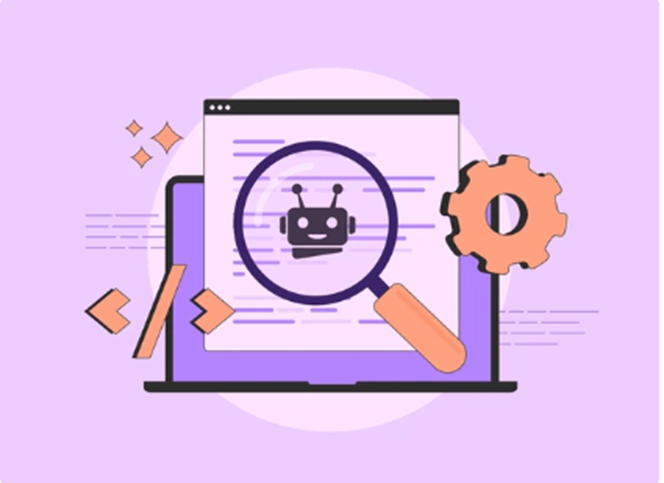The Role of AI in Modern Content Management Systems

Strong 8k brings an ultra-HD IPTV experience to your living room and your pocket.
In the rapidly evolving digital landscape, content management systems (CMS) have become indispensable tools for businesses and individuals alike. These systems enable users to create, manage, and publish digital content with ease. However, as the volume and complexity of content have grown, so too has the need for more sophisticated tools. Artificial intelligence (AI) has emerged as a transformative force, enhancing the capabilities of modern CMS platforms. By automating tasks, personalizing user experiences, and improving content strategies, AI is revolutionizing how we manage digital content.
Here are some roles of AI in modern content management systems:
• Voice and Conversational Interfaces
AI is revolutionizing how users interact with content management systems by introducing voice commands and conversational interfaces. This innovation enables users to create, edit, and retrieve content seamlessly through natural language processing (NLP) technologies. For example, a CMS powered by AI could allow a user to say, "Create a blog post about our latest product launch" or "Find the annual sales report for 2023," and the system would execute the task instantly. These intuitive interfaces simplify complex workflows, making CMS platforms more accessible for users with limited technical expertise.
• Managing Augmented and Virtual Reality Content
As AR and VR become more prevalent, AI is taking on a pivotal role in managing immersive content within CMS platforms. AI helps businesses store, organize, and optimize AR/VR assets for various applications, such as virtual showrooms, interactive training modules, or 3D product demonstrations.
By analyzing user engagement data, AI can suggest improvements to AR/VR content, ensuring a more impactful and engaging experience. For example, retail businesses can use AI-integrated CMS platforms to deliver personalized virtual shopping experiences, tailoring recommendations based on user preferences and behavior.
• Hyper-Personalization for Content Delivery
AI is driving hyper-personalization in content management systems, enabling businesses to deliver highly customized experiences to individual users or micro-segments of their audience. By analyzing data such as browsing behavior, purchase history, and demographic information, AI can curate content recommendations tailored to user preferences.
For example, an AI-powered CMS could automatically adjust a website’s homepage to feature products or articles that align with a visitor's interests, improving engagement and conversion rates. This level of personalization enhances user satisfaction and fosters brand loyalty.
• Autonomous Content Management
The future of CMS lies in autonomous systems that can manage the entire content lifecycle without human intervention. AI-driven CMS platforms can automatically generate, publish, update, and retire content based on performance metrics and trends. For instance, an AI-powered system might analyze engagement data to identify underperforming blog posts, refresh them with updated information, and republish them to boost visibility.
Similarly, it can detect outdated content and archive it to maintain relevance. Autonomous content management frees up human resources for strategic decision-making while ensuring the CMS operates efficiently and effectively.
• AI-Powered Content Creation
AI is reshaping content creation by enabling CMS platforms to generate high-quality, human-like text based on predefined parameters. Using Natural Language Generation (NLG) technologies, AI can produce articles, social media posts, product descriptions, and more, tailored to specific audiences and objectives.
For instance, e-commerce businesses can utilize AI to automatically generate detailed product descriptions optimized for search engines, saving time and effort. Tools like OpenAI’s GPT models have made it possible to draft compelling content in seconds, allowing businesses to scale their content production without compromising quality. This capability also supports multilingual content creation, making it easier for businesses to expand globally.
• Advanced Search and Metadata Tagging
AI enhances search functionalities within CMS platforms by using machine learning algorithms and natural language understanding. Traditional keyword-based search often returns an overwhelming number of results, leaving users to sift through irrelevant data. AI-driven enterprise search tools can analyze context, user intent, and semantic relationships to deliver more accurate results. Moreover, AI can automate metadata tagging by analyzing the content of files, images, or videos and assigning relevant tags. For example, a CMS with AI-powered search can help a marketing team quickly locate an image by recognizing objects or text within the image itself. This efficiency improves productivity and ensures faster access to critical information.
AI-Driven Insights and Analytics-
• Real-Time Analytics for Performance Tracking
AI-powered content management systems provide real-time analytics, enabling businesses to monitor the performance of their content as it happens. These systems analyze metrics such as page views, time spent on pages, bounce rates, and conversion rates to identify trends and patterns. For example, AI can detect which blog posts are driving the most traffic or which product pages are leading to sales. By presenting this data in easy-to-understand dashboards, businesses can make quick, informed decisions to optimize their content strategies.
• Predictive Analytics for Content Strategy
AI-driven predictive analytics help businesses forecast future trends based on historical data. For instance, an AI system might analyze seasonal data to predict which types of content will perform best during holiday periods or identify emerging industry topics that can drive engagement. This enables content managers to proactively create and publish content that aligns with audience interests and market demands, giving them a competitive edge.
• Heatmap Analysis for Content Optimization
AI-driven heatmap tools track user interactions with websites, such as clicks, scrolls, and cursor movements. This data provides valuable insights into how users navigate a website and which sections draw the most attention. Businesses can use these insights to optimize their website layouts, improve call-to-action placements, and enhance user experiences, ensuring that content aligns with user behavior for maximum impact.
• ROI Measurement and Reporting
AI-driven insights provide a more accurate measurement of content Region of Interest (ROI) by linking content performance to business outcomes. For instance, AI can analyze how a specific piece of content contributes to lead generation, customer retention, or revenue growth. These insights help businesses prioritize content efforts that deliver the highest returns, ensuring that marketing budgets are spent effectively.
• Competitive Analysis
AI tools can also gather insights about competitors by analyzing their content strategies, keyword usage, and audience engagement levels. This competitive analysis helps businesses identify gaps in their own strategies and uncover opportunities to differentiate themselves. For example, if AI detects that competitor are excelling in video content while a business is lacking in that area, it can recommend investments in video production to stay competitive.
AI-Powered Content Security-
• Threat Detection and Prevention
AI systems monitor CMS platforms for unusual activities, such as unauthorized logins, large data downloads, or changes in file access patterns. By using machine learning algorithms, AI can detect threats like data breaches or malware attacks in real-time and alert administrators before significant damage occurs.
• Automated Compliance Checks
AI helps ensure compliance with regulations like GDPR, HIPAA, or CCPA by scanning content for sensitive data, such as personally identifiable information (PII). For instance, AI can identify credit card numbers, medical records, or social security numbers stored in unauthorized locations and prompt immediate action.
• User Access Management
AI enhances security by analyzing user behavior and granting or restricting access based on activity patterns. For example, if a user suddenly accesses files outside their usual scope of work, AI can flag this as suspicious and temporarily block access to prevent potential misuse.
• Data Encryption and Privacy Safeguards
AI systems ensure that sensitive content is encrypted both at rest and in transit. Advanced AI models can dynamically apply encryption protocols based on the content's sensitivity level, reducing the risk of data leaks while balancing system performance.
• Secure Collaboration Tools
AI-enabled content management platforms offer secure environments for collaboration by preventing unauthorized sharing or downloading of sensitive files. For instance, AI can restrict users from emailing confidential documents or downloading them to unverified devices, ensuring data security during team collaborations.
• Content Version Control and Audit Logs
AI tools maintain detailed audit logs that track every change made to content, including who accessed or modified it. These logs are crucial for tracing the origin of unauthorized changes and maintaining version control, helping businesses quickly identify and address vulnerabilities.
• Phishing Attack Mitigation
AI-powered systems analyze incoming emails, comments, or uploaded files to detect phishing attempts. By identifying malicious links, unusual requests, or fake sender credentials, AI reduces the risk of phishing attacks targeting CMS users.
• Insider Threat Management
AI algorithms monitor employee activities to detect insider threats, such as attempts to download or share confidential information. By analyzing patterns over time, AI can distinguish between routine behavior and suspicious actions, helping businesses mitigate risks from within.
Conclusion-
AI has fundamentally transformed modern content management systems, offering unprecedented capabilities that enhance efficiency, personalization, and security. By automating routine tasks, delivering actionable insights, and enabling innovative user experiences, AI empowers businesses to stay competitive in an increasingly digital world. While challenges such as cost and complexity remain, the benefits of AI integration far outweigh the drawbacks.
As AI technology continues to evolve, its role in CMS will only become more integral. For businesses looking to stay ahead, embracing AI-driven CMS solutions is not just an option—it’s a necessity.
Note: IndiBlogHub features both user-submitted and editorial content. We do not verify third-party contributions. Read our Disclaimer and Privacy Policyfor details.







